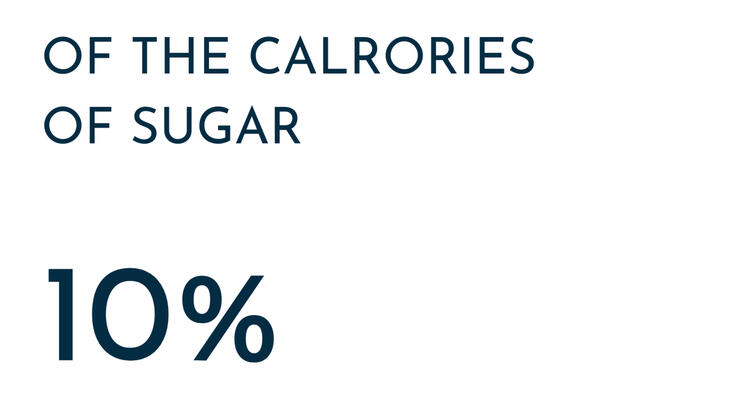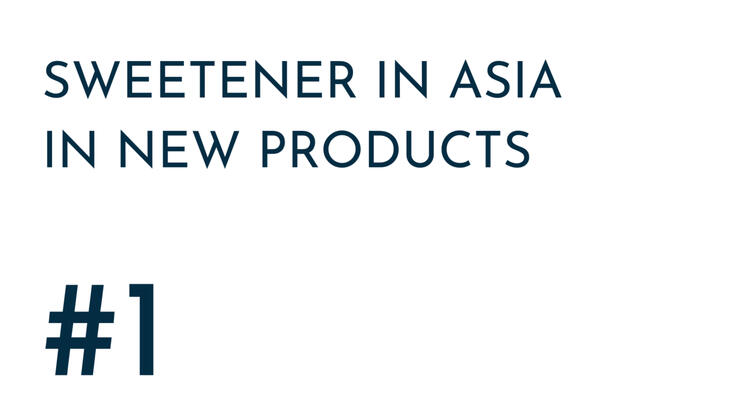
The Simple Sweetener
The new way from Japan to reduce 90% of sugar in any recipe without sacrificing taste for Indian manufacturers, bakers & aspiring Willy Wonkas.
Real sugar. Not sugar-like.
Enabling health & indulgence
Sugar is the backbone of food and beverage products, but in our calorie-laden world, it fuels obesity and disease. Allulose changes this. It is not artificial—a saccharide like sucrose and fructose, without the calories. Discovered in 1991 by Ken Izumori from soil microbes, the Izumoring process makes this rare sugar affordable and sustainable.Next-generation sweeteners meet demand for reduced-sugar products while preserving taste and texture. Sucroless™ harnesses allulose to create indulgent treats. We partner with innovative food brands to supply superior, lower-calorie, nutrient-dense products for discerning customers.If this is missing from your shelf, we would love to work with you.

One sweetener. For any recipe.
Why allulose works
Among 16 sugar substitutes tested, allulose excels in taste, functionality and health. This rare monosaccharide, fructose's C-3 epimer, mimics sugar at low metabolic cost: 70% sucrose sweetness, 0.4 kcal/g and negligible glycemic index. It browns and caramelises when heated, unlike erythritol, which crystallises oddly. Blended with steviol glycosides and monk fruit, Sucroless™ yields rounded sweetness sans aftertaste.Replacements must offer bulk, browning and binding while preserving taste—vital for 81% of consumers. Allulose launches rose 40% from 2022 to 2024, with benefits including browning and gut health.
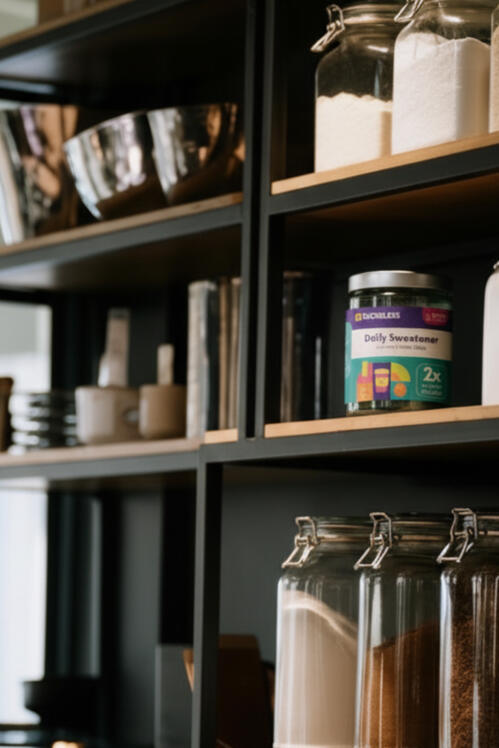
A comparison table highlighting three critical metrics based on a psychophysical study1
Why Sucroless™?
Choose Precision for 1:1 sugar substitution when bulk matters, or Daily for double intensity at half the price. Both are enzymatically derived from sugar - like hyaluronic acid or select cheeses - ensuring safety and reliability. Naturally in figs and other plants, allulose mimics sugar for rich ice cream, chewy sweets and smooth syrups.Key advantages:
Sweetness growth matches sucrose (1.31), for proportional rises with concentration, unlike high-intensity sweeteners’ flat responses. Calories stay minimal, with near 1:1 potency to sugar, easing reformulations.
The blend merges allulose’s sucrose-like response with stevia and monk fruit’s zero calories, for better results in bakery, dairy and confectionery.
01.
Browns like
sugar
02.
Caramelises
like sugar
03.
Rich, scoopable
ice cream
04.
Reduce sugar in any recipe
Years of use in Japan
20+

Sugar saving per serving
24g
Sucroless™ elevates a wide variety of applications:

Baked goods
Enable excellent browning via Maillard reactions but can accelerate rapidly, so use lower oven temperatures and blend with fibers or sucrose for structural integrity.

Ice creams & Sorbets
It acts as a freezing point depressant for smooth textures, with no cooling effect for rich scoopable ice creams and balanced sweetness.

Mithai
Get authentic sweetness whilst maintaining syrup integrity and moisture balance without crystallisation in preparations like rasmalai and gulab jamun.

Syrups and sweet sauces
It resists crystallisation, maintains consistency, and caramelises quickly under careful temperature monitoring for near zero GI products.

Dairy products
Sweeten ready-to-drink applications such as chocolate milk, preserving clean taste and mouthfeel without affecting texture or shelf life, and increase nutrient density, and greatly reduced glycemic impact.
Our key ingredients
Allulose is 70% as sweet as sugar. In order to match it's sweetness intensity (critical in usage), Sucroless™ sweeteners are blends of allulose, stevia and monk fruit to match sucrose as close as earthly possible.Zero-glycaemic rare sugars, potent antioxidants like mogroside V (monk fruit's exclusive triterpene glycoside) and premium steviol glycosides such as rebaudioside M deliver crisp sweetness, potentially fight oxidative stress and sustain healthy metabolism.These sweeteners - from enzymatic epimerisation, fruit extraction and plant glycosides - promote genuine pleasure and wellness.
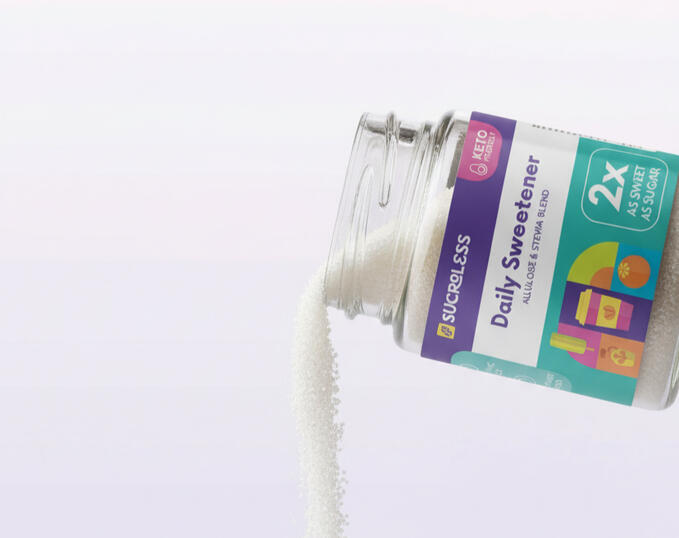
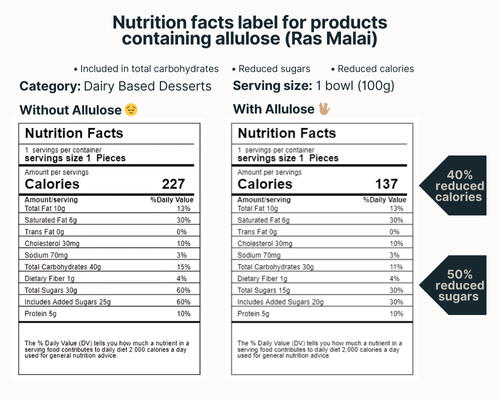
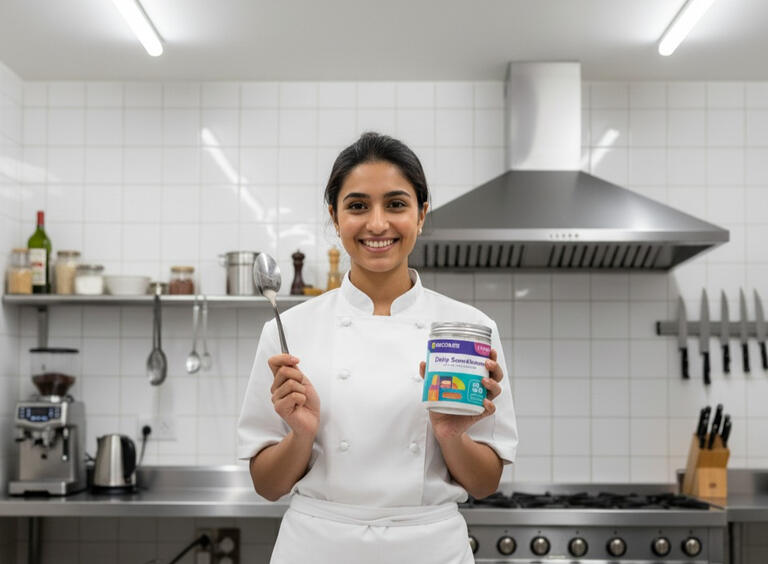
Blend Sucroless™ seamlessly with sugar
Clinical trials confirm allulose mimics sucrose's sweetness curve, enabling 50-100% reductions (per formulation) to boost performance and consumer appeal.
Real reductions in practice
| Application | Sugar Reduction | Calorie Savings |
|---|---|---|
| Baked Goods (Muffin) | 50% reduction | 25% less calories |
| Frozen Desserts (Ice Cream) | 100% replacement | 42% less calories |
| Mithai (Rasmalai) | 65% reduction | 47% less calories |
| Beverages (Chocolate Milk) | 100% replacement | 53% less calories |
| Sauces (Ketchup) | 100% replacement | 95% less calories |
Trusted by nutritionists & bakers

"We ran some trials with the Sucroless™ Allulose earlier this week. Cake has come out fantastic! Hrithik took a lot of cakes. Loved them."
Radhieka, Fitness Bakery, Mumbai

"Allulose tastes great. Sanjeev,
let me know when we can buy
1 kg allulose, customers
keep liking it."
Tara , Bombay Bizarre Bakery

"Sucroless™ Allulose is a low-calorie... sweetener that mimics sugar's taste but with no impact on blood sugar, making it ideal for diabetics."
Shashikant Iyengar, Expert Metabolic Health Coach

"It really is close to sugar with no aftertaste, We used to use erythritol and stevia mixed. Little less sweet but enough to enjoy these sweet balls."
Satyajit Dash,
Cardio-metabolic Coach
The sugar problem
Indulgence sells
Nearly three-quarters of consumers find sweet snacking appealing, yet over 60% consider healthfulness in buying decisions. In Asia and America, allulose powers products from Korean ketchup to Coca-Cola's reduced-sugar drinks. Each calorie consumed delivers more protein, calcium and vitamins. Products become more efficient at meeting nutritional needs - a standard metric endorsed by health organisations globally.Sucroless™ enables manufacturers to meet this demand without the drawbacks of alternatives like erythritol. Allulose is, since 2019, the most used sweetener in new products in Asia and growing globally.
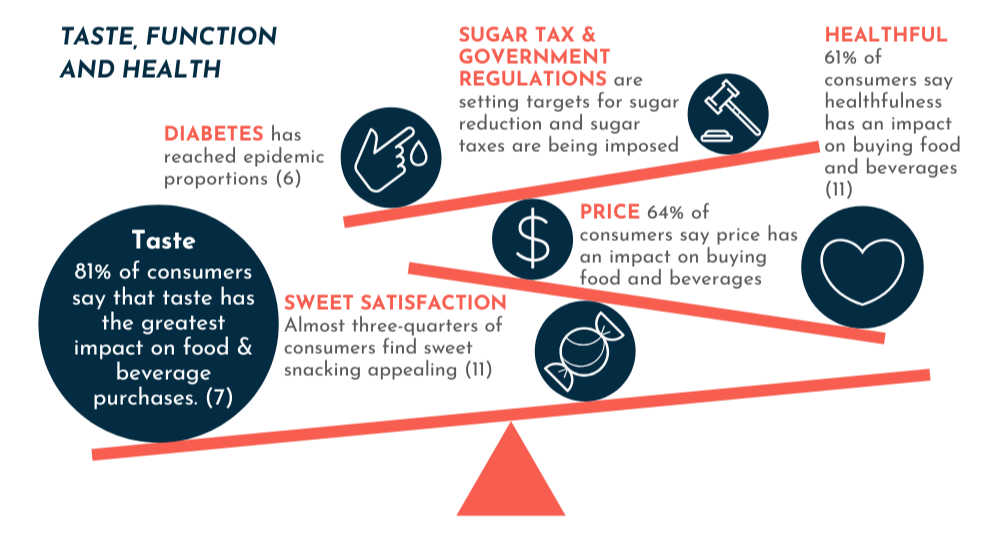
Pros & Cons of 16 sweeteners
FAQs
See what the world is saying about allulose:
South Korea's big bet on allulose
Read the article
Does Allulose Appeal to Consumers?
Read the article
Indian Cardiologist suggests allulose
Read the article
Partner with us

The goal is to replace 10,000 tons of sugar in India which is 40 billion calories
Reformulation trials often waste time on unstable alternatives. For Indian manufacturers, we are offering a route to cutting sugar and gaining market share at the growing intersection of indulgence and health.What to expect when working with us:
Please fill out the form or call us, we will revert with optimal suggestions. Then we can agree on a lab/batch trial and free samples and get to market quickly. In our experience, reformulation times are cut drastically with Sucroless™.
For partnerships or to learn more
about our technology..
HD823, Enam Sambhav, C - 20 G Block Rd Bandra Kurla Complex Mumbai, 400051
© Hexicose Foods
Privacy Policy
Last Updated: October 18, 2025
IntroductionWelcome to Hexicose Foods (OPC) Pvt. Ltd. ("we," "us," or "our"). We are committed to protecting your personal data and ensuring compliance with the Digital Personal Data Protection Act, 2023 (DPDP Act) and other applicable laws in India. This Privacy Policy explains how we collect, use, process, store, disclose, and safeguard your personal data when you access our website www.sucroless.com use our mobile application, or engage with our services (collectively, the "Services").
By using our Services, you consent to the collection, processing, and use of your personal data as described in this Privacy Policy. If you do not agree with this policy, please refrain from using our Services.1. Information We Collect
We may collect the following types of information, as defined under the DPDP Act as "personal data" (any data that can identify an individual):
a. Personal DataContact Information: Name, email address, phone number, or postal address provided when you register, contact us, or use our Services.
Account Information: Username, password, or other credentials used to access our Services.
Sensitive Personal Data or Information (SPDI): Financial data (e.g., bank account or credit/debit card details), biometric data, or other sensitive information as defined under the Information Technology (Reasonable Security Practices and Procedures and Sensitive Personal Data or Information) Rules, 2011, if applicable.
Demographic Information: Age, gender, or other details you voluntarily provide.b. Non-Personal DataUsage Data: Information about your interactions with our Services, such as pages visited, time spent, links clicked, or features used.
Device Information: Information about the device used to access our Services, including IP address, browser type, operating system, and device identifiers.
Cookies and Tracking Technologies: We use cookies, web beacons, and similar technologies to collect information about your browsing behavior and preferences. See our Cookie Policy for details.c. Information from Third PartiesWe may collect information from third parties, such as social media platforms or analytics providers, when you interact with our Services through those platforms or services, subject to your consent where required.2. Purpose of Data Collection
We collect and process your personal data for the following purposes, in compliance with the DPDP Act:To provide, operate, and improve our Services.
To process transactions, fulfill orders, or manage subscriptions.
To communicate with you, including sending service-related updates, promotional materials (with your consent), or responding to inquiries.
To personalise your experience by tailoring content or recommendations.
To analyze usage trends and optimize the performance of our Services.
To comply with legal obligations under Indian laws, including the DPDP Act and IT Act, 2000.
To prevent fraud, ensure security, and enforce our policies.We will process your personal data only for the purposes for which it was collected, unless we obtain your explicit consent for additional purposes or as permitted by law.
3. Lawful Basis for Processing
We process your personal data based on the following lawful grounds under the DPDP Act:Consent: Where you have provided clear and specific consent for processing (e.g., for marketing communications).
Contractual Necessity: To fulfill our obligations under a contract with you (e.g., to provide Services).
Legal Obligation: To comply with applicable laws or regulations in India.
Legitimate Interests: For purposes such as improving our Services or ensuring security, provided it does not override your rights and freedoms.4. How We Share Your Data
We do not sell your personal data. We may share your data in the following circumstances, subject to compliance with the DPDP Act and other Indian laws:Data Fiduciaries and Processors: With trusted third-party service providers who process data on our behalf (e.g., payment processors, hosting providers, or analytics services), under strict data protection agreements.
Business Transfers: In the event of a merger, acquisition, or sale of assets, your data may be transferred, with appropriate safeguards.
Legal Requirements: To comply with Indian laws, court orders, or government requests, such as those from law enforcement authorities.
Protection of Rights: To protect our rights, property, or safety, or that of our users or the public.5. Your Rights Under the DPDP Act
As a "Data Principal" under the DPDP Act, you have the following rights regarding your personal data:Right to Access: Request information about the personal data we hold about you and how it is processed.
Right to Correction: Request correction of inaccurate or incomplete personal data.
Right to Erasure: Request deletion of your personal data, subject to legal exceptions (e.g., data required for legal compliance).
Right to Data Portability: Request a copy of your personal data in a structured, commonly used, and machine-readable format.
Right to Withdraw Consent: Withdraw your consent for data processing at any time, where processing is based on consent.
Right to Nominate: Nominate an individual to exercise your rights in case of your death or incapacity, as per the DPDP Act.
Right to Grievance Redressal: Lodge a complaint with us or the Data Protection Board of India if you believe your rights have been violated.To exercise these rights, please contact our Data Protection Officer at [email protected] We may verify your identity before processing your request.6. Cookies and Tracking Technologies
We use cookies and similar technologies to enhance your experience, analyze usage, and deliver personalized content. You can manage cookie preferences through your browser settings or our consent management tool. For more details, see our Cookie Policy.7. Data Security
We implement reasonable security practices and procedures as required under the Information Technology (Reasonable Security Practices and Procedures and Sensitive Personal Data or Information) Rules, 2011 and the DPDP Act. These include technical and organizational measures to protect your personal data from unauthorized access, use, or disclosure. However, no method of transmission over the internet or electronic storage is entirely secure, and we cannot guarantee absolute security.8. Data Retention
We retain your personal data only for as long as necessary to fulfill the purposes outlined in this Privacy Policy or as required by Indian law. When no longer needed, we securely delete or anonymize your data in accordance with applicable regulations.9. International Data Transfers
If your personal data is transferred outside India, we ensure compliance with the DPDP Act and other applicable laws. We will only transfer data to jurisdictions or entities that provide an adequate level of data protection or under appropriate safeguards, such as Standard Contractual Clauses.10. Third-Party Links
Our Services may contain links to third-party websites or services. We are not responsible for their privacy practices or content. Please review their privacy policies before engaging with them.11. Children's Privacy
Our Services are not intended for individuals under the age of 18. We do not knowingly collect personal data from children. If we learn that we have collected such data, we will take steps to delete it in accordance with the DPDP Act.
12. Grievance Redressal
If you have any concerns or complaints about how we handle your personal data, please contact our Data Protection Officer at [Your Contact Email]. We will respond promptly in accordance with the DPDP Act. You may also escalate complaints to the Data Protection Board of India if unresolved.13. Changes to This Privacy Policy
We may update this Privacy Policy from time to time to reflect changes in our practices or legal requirements. The updated policy will be posted on our website with the "Last Updated" date. We encourage you to review this policy periodically.14. Contact Us
For any questions or to exercise your rights, please contact our Data Protection Officer:
Email: [email protected]
Address: HD823 WeWork Enam Sambhav C - 20 G Block Rd, G Block BKC Bandra Kurla
Complex, Bandra East, Mumbai, Maharashtra 400051
Phone: +917249571080

